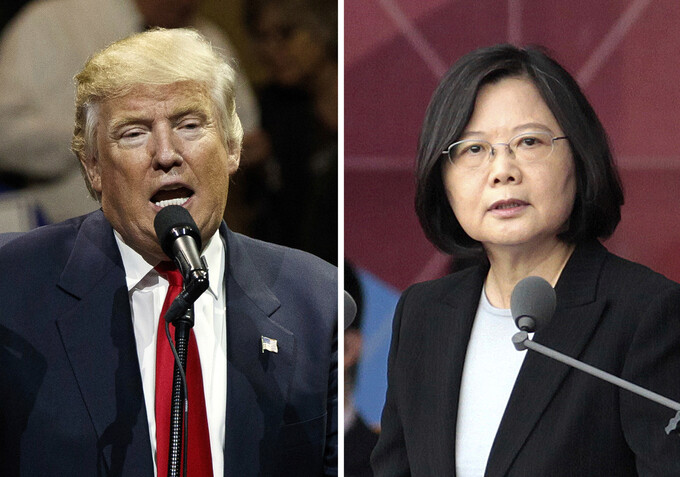hankyoreh
Links to other country sites 다른 나라 사이트 링크
[Editorial] How new US-China tensions could destabilize East Asia

US President-elect Donald Trump spoke on the phone on Dec. 2 with Taiwanese President Tsai Ing-wen. As the first direct conversation between US President or President-elect in 37 years, it appears likely to have a serious impact on relationship between Washington and Beijing. It‘s also yet another disaster to join the trouble in the South China Sea, the North Korean nuclear issue, economic frictions, and issues over South Korean deployment of a Terminal High Altitude Area Defense (THAAD) missile defense system.
The idea of “one China” is a core principle in Beijing’s foreign policy, and one that past US administrations have respected. If Trump deliberately broke with it, then US-China relations are in for a fundamental change. Trump had already accused China of exchange rate manipulations during his presidential campaign and declared that he would impose high duties on Chinese products. Various analyses have already been offered to what his intentions were in playing the Taiwan card - one of China‘s most sensitive spots - but what is clear is that US-China ties are about to be put to a new test. The fact that Beijing is dismissing it for now as a “joke instigated by Taiwan” is a signal that it doesn’t want a head-on clash with Washington.
Conflicts between US and China have a major impact on the Korean Peninsula. The North Korean nuclear issue is a perfect example. Washington and Beijing’s strategic confrontation is one of the main reasons that situation has deteriorated so quickly over the past few years. Once frictions between them reach a certain point, it will be all but impossible to find a solution. The THAAD issue, which has recently led to what have seemed like retaliatory measures from China against South Korean companies, is also basically a product of this conflict. It may be pettiness from Beijing to pressure those businesses with tax audits and import regulations, but the THAAD issue is not going to be resolved either until distrust between Washington and Beijing subsides.
The US and China need to be the big countries they are and refrain from acting unilaterally. President-elect Trump’s “America first” vision should not be premised on sacrifices from other countries or deterioration in their political circumstances. China‘s aggressively Sinocentric stance also needs to come to an end. For East Asia in particular, Washington and Beijing’s clashing helps no one.
Please direct questions or comments to [english@hani.co.kr]

Editorial・opinion
![[Column] Park Geun-hye déjà vu in Yoon Suk-yeol [Column] Park Geun-hye déjà vu in Yoon Suk-yeol](https://flexible.img.hani.co.kr/flexible/normal/500/300/imgdb/original/2024/0424/651713945113788.jpg) [Column] Park Geun-hye déjà vu in Yoon Suk-yeol
[Column] Park Geun-hye déjà vu in Yoon Suk-yeol![[Editorial] New weight of N. Korea’s nuclear threats makes dialogue all the more urgent [Editorial] New weight of N. Korea’s nuclear threats makes dialogue all the more urgent](https://flexible.img.hani.co.kr/flexible/normal/500/300/imgdb/original/2024/0424/7317139454662664.jpg) [Editorial] New weight of N. Korea’s nuclear threats makes dialogue all the more urgent
[Editorial] New weight of N. Korea’s nuclear threats makes dialogue all the more urgent- [Guest essay] The real reason Korea’s new right wants to dub Rhee a founding father
- [Column] ‘Choson’: Is it time we start referring to N. Korea in its own terms?
- [Editorial] Japan’s rewriting of history with Korea has gone too far
- [Column] The president’s questionable capacity for dialogue
- [Column] Are chaebol firms just pizza pies for families to divvy up as they please?
- [Column] Has Korea, too, crossed the Rubicon on China?
- [Correspondent’s column] In Japan’s alliance with US, echoes of its past alliances with UK
- [Editorial] Does Yoon think the Korean public is wrong?
Most viewed articles
- 1‘We must say no’: Seoul defense chief on Korean, USFK involvement in hypothetical Taiwan crisis
- 2Will NewJeans end up collateral damage in internal feud at K-pop juggernaut Hybe?
- 3[Column] Park Geun-hye déjà vu in Yoon Suk-yeol
- 4Why Korea shouldn’t welcome Japan’s newly beefed up defense cooperation with US
- 5Thursday to mark start of resignations by senior doctors amid standoff with government
- 6N. Korean hackers breached 10 defense contractors in South for months, police say
- 7[Guest essay] The real reason Korea’s new right wants to dub Rhee a founding father
- 8[Column] ‘Choson’: Is it time we start referring to N. Korea in its own terms?
- 9Kim Jong-un expressed ‘satisfaction’ with nuclear counterstrike drill directed at South
- 10[Editorial] New weight of N. Korea’s nuclear threats makes dialogue all the more urgent